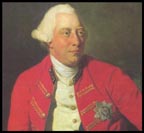


|
The Age of George III |
I am happy that you are using this web site and hope that you found it useful. Unfortunately, the cost of making this material freely available is increasing, so if you have found the site useful and would like to contribute towards its continuation, I would greatly appreciate it. Click the button to go to Paypal and make a donation.
 Henry Addington
formed his ministry when Pitt the Younger
resigned over the issue of Catholic Emancipation
following the Act of Union with Ireland.
He had been Speaker of the House of Commons since 1789 but had to resign this
post in order to form his ministry.
Henry Addington
formed his ministry when Pitt the Younger
resigned over the issue of Catholic Emancipation
following the Act of Union with Ireland.
He had been Speaker of the House of Commons since 1789 but had to resign this
post in order to form his ministry.
On 2 April 1801 the Danish fleet in Copenhagen was destroyed by Nelson: this was an attempt to break up the Northern League, an organisation that opposed the Royal Navy's practice of "stop and search" towards neutral shipping. The Northern League was a resurrection of the League of Armed Neutrality that had been formed by the Baltic States during the American War of Independence.. Addington supported Nelson but at heart wanted to negotiate a peace with France. Consequently he rescinded an order that enabled the Royal Navy to arrest French fishermen. That led to a resumption of diplomatic recognition between France and Britain. Throughout the summer and autumn of 1801, French ambassador Otto, Addington and his Foreign Secretary Lord Hawkesbury (later to become Lord Liverpool) conducted talks with a view to concluding a peace settlement. During this period, it was becoming increasingly clear that Pitt was dissatisfied as a mere MP and he began to turn against his friend Addington.
On 25 March 1802 the Peace of Amiens was signed, ending the war with France. Britain relinquished her control over all the territories she had won, except Trinidad and Ceylon,. Malta was returned to the Knights of St John of Jerusalem, Egypt and the Cape of Good Hope were given up In return, the French agreed to evacuate Italy. The peace treaty marked the high point of Addington's short ministry, particularly since his first budget repealed Income Tax. However, Addington decided to overhaul the entire tax system and he did much to rationalise the nation's finances. He brought a great deal of criticism on himself in July 1802 when he appointed his son to a £3,000 p.a. sinecure of Clerk of the Pells and was accused of nepotism.
A general election was held in July 1802, resulting in the strengthening of Addington's ministry. In France the following month, Napoleon Bonaparte was elected First Consul for life and began to build up the French army despite the cessation of hostilities with Britain. In October, Napoleon organised an insurrection in Switzerland; Addington promised money and moral support to the Swiss if they chose to fight, and also delayed the evacuation of British troops from the various colonies that had been agreed in the peace treaty. However, he was both unwilling and unable to take any further action and appeared to be heading a weak ministry.
1802 saw the passing of the first Factory Act. Also, Jeremy Bentham was gaining recognition for his work in France although in Britain he was on the verge of bankruptcy because a series of governments had not paid him for his work on the panopticon, a project into which he had poured his own money. However, the government did award Edward Jenner £10,000 to carry on his work in developing a vaccine against smallpox.
Realising that his ministry was weak, Addington opened negotiations with Pitt in January 1803, to bring him into the ministry. Pitt rejected the post of Chancellor of the Exchequer, saying he would return to office only as PM. Desperate to have Pitt back in power, Addington suggested a ministry with Pitt's brother, Lord Chatham, as PM. Pitt insisted that Lord Grenville (Pitt's cousin) should head the ministry. Since neither man would compromise, negotiations broke down and Addington continued in office.
Between January and May 1803, Britain and France argued over the terms of the Peace of Amiens: neither side was keeping the terms of the treaty and it became clear that the war would be resumed. Unfortunately for Britain, Addington was convinced that the peace would be permanent so he had reduced the size of both the army and the navy in an attempt to save money. When the war resumed on 18 May 1803, Britain was ill prepared. Addington's parliamentary speech failed to inspire MPs whereas Pitt gave another demonstration of his skills as an orator. Public opinion turned against Addington even more when he reintroduced Income Tax, now to be collected at source.
In July 1803 Addington had to face two main problems. The first followed the passing of the Military Service Act, which allowed volunteers to enlist to fight against the French. Over 300,000 men volunteered and the government was unable to cope with the sheer numbers. It was forced to abandon the legislation. In Ireland a rising took place led by Robert Emmet, brother of Thomas who led the 1798 Irish Rising. Robert Emmet was tried, found guilty and executed in September.
By December 1803, Pitt was opposing the government openly and continued to do so until Addington resigned in May 1804. Pitt returned to office as PM at the head of a weakened ministry and Addington was elevated to the House of Lords as Viscount Sidmouth.
| Meet the web creator | These materials may be freely used for
non-commercial purposes in accordance with applicable statutory allowances
and distribution to students. |
Last modified
12 January, 2016
|